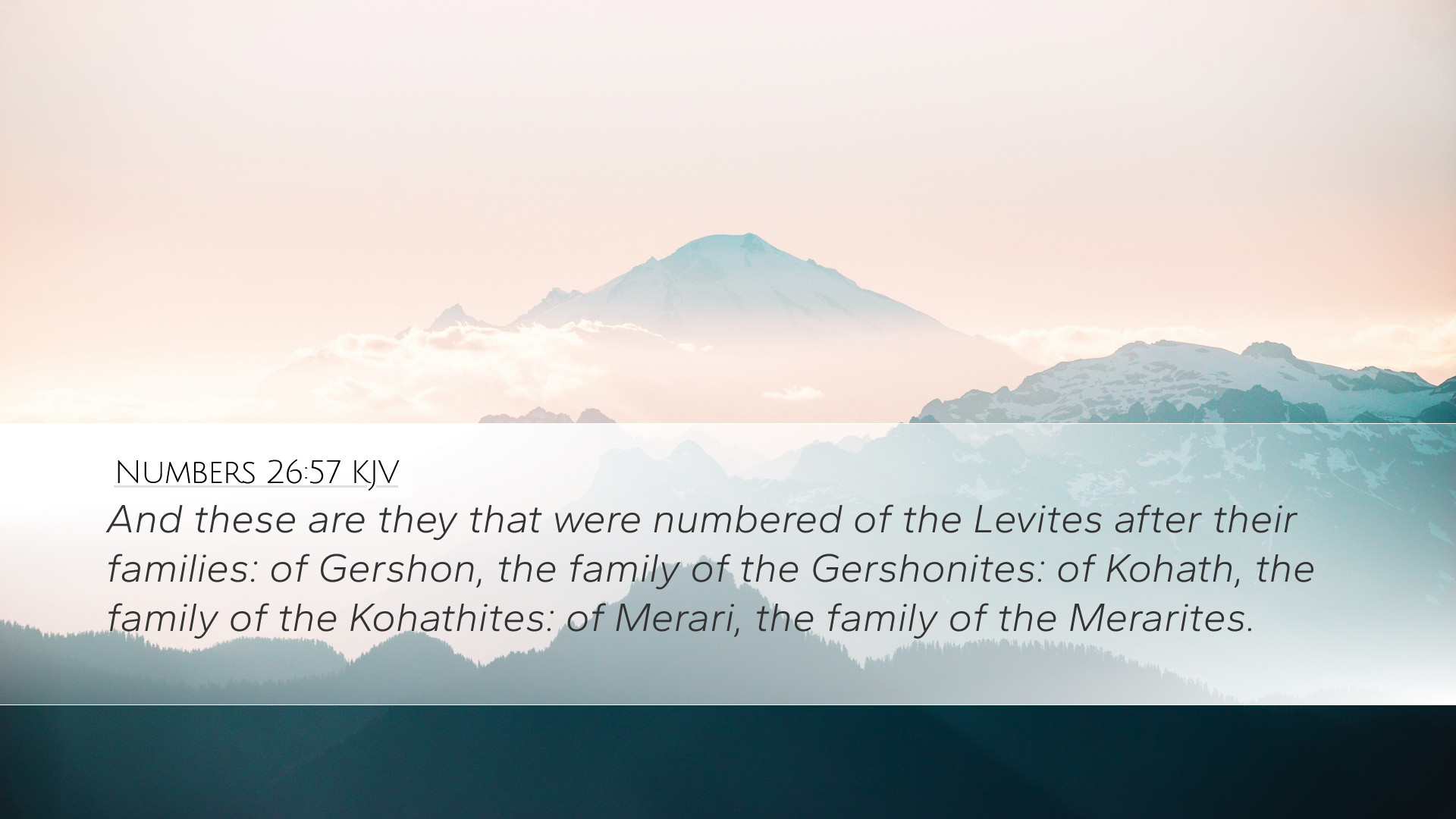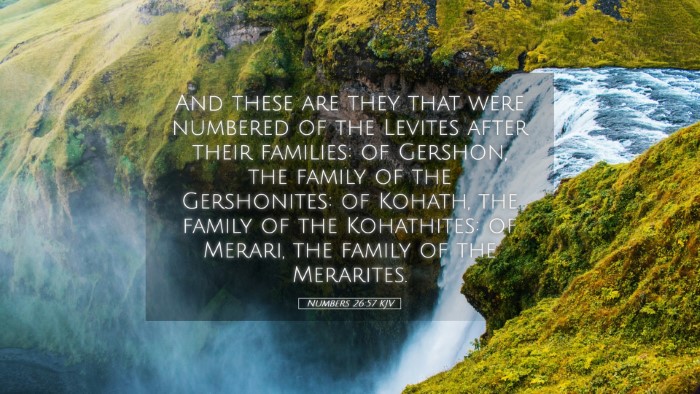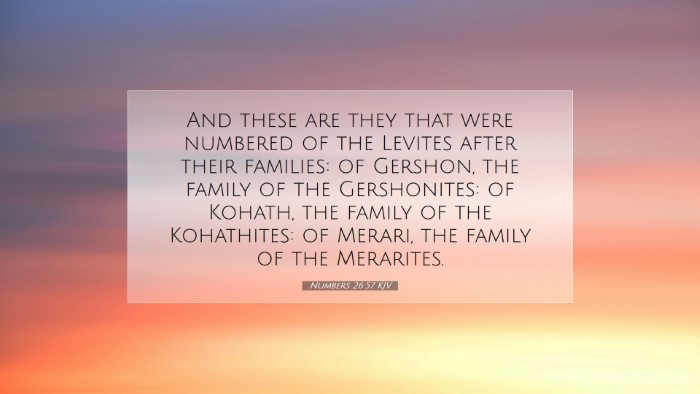Commentary on Numbers 26:57
Numbers 26:57 states: "And these are they that were numbered of the Levites after their families: of Gershon, the family of the Gershonites: of Kohath, the family of the Kohathites: of Merari, the family of the Merarites."
Introduction
The book of Numbers serves as a crucial bridge in the narrative of the Israelites' journey from Egypt to the Promised Land. It emphasizes the organization of the Israelite community, their camp structure, and the role of the Levites among them. Numbers 26:57 specifically details the families of the Levites, highlighting their importance in the worship and service of God.
Historical Context
The Levites were set apart from the other tribes of Israel for a sacred ministry. This separation is rooted in the historical events at Sinai when the tribe of Levi distinguished themselves by their loyalty to God during the idolatry of the golden calf. Thus, this verse's context is essential for understanding the theological implications throughout Israel's history.
From Matthew Henry's Commentary
Matthew Henry emphasizes the importance of recognizing God's order in the congregation. He notes:
- Divine Appointment: The selection of the families - Gershon, Kohath, and Merari - reflects God's intentional design. Each family had distinct responsibilities regarding the transportation and maintenance of the tabernacle.
- Preservation of Identity: Henry highlights that the naming of these families preserves their identities and functions within the community. This signifies that every tribe has a role in God's plan.
- Ongoing Service: The mention of the Levites reminds the people of their continuous duty to serve God, reinforcing that service is integral to the Israelite identity.
From Albert Barnes' Notes on the Bible
Albert Barnes elaborates on the considerations of the Levites' census, providing practical insights:
- Family Distinctions: He interprets the distinctions among the families as crucial for operational efficiency within the Levitical service. Each family had specific duties concerning the temple's furnishings and rituals.
- Symbolism of Service: Barnes suggests that these family divisions symbolize the broader diversity of service in the kingdom of God, where various roles contribute to the whole body’s effectiveness.
- Servants of the Sanctuary: The Levites were not merely religious functionaries; they were servants specifically tasked with maintaining holiness in worship and facilitating the people's access to God.
From Adam Clarke's Commentary
Adam Clarke offers an in-depth analysis of the structure and meaning behind this passage:
- Genealogical Importance: Clarke notes that genealogies serve to authenticate claims to priesthood and service. The families' listing reinforces their status and God’s promise to maintain the Levites as His chosen servants.
- Significance for Worship: The explicit mention of each family points towards the necessary structure that supports communal worship. Each Levite family contributed uniquely to maintaining the tabernacle’s sanctity.
- Lessons for Future Generations: Clarke emphasizes that Scriptures like this provide future generations with a lineage that ties back to divine promises and covenants.
Theological Implications
This verse carries significant theological implications, particularly concerning the nature of God’s covenant with His people:
- God's Covenant Faithfulness: The census serves as a reminder of God's promise to the tribe of Levi, ensuring their place in sacred service as a response to their faithfulness during Israel's darkest hour.
- Community Order: The well-ordered structure of the Levites illustrates the broader principle of order in God’s community. It shows that structure is vital for spiritual and communal health.
- Role of Leadership: The Levites, by virtue of their designation, indicate the necessity of having dedicated leaders within the community to guide those in worship and maintain theological integrity.
Practical Applications
For contemporary readers, especially pastors and theologians, Numbers 26:57 presents several practical applications:
- Understanding Spiritual Gifts: Just as the Levites had distinct roles, believers today are endowed with spiritual gifts designed to serve the church’s mission and facilitate worship.
- Value of Heritage: The importance of spiritual heritage as seen in the Levites reminds modern Christians of the faithfulness of God throughout history. Understanding this lineage can deepen faith and commitment to God’s work.
- Commitment to Service: The commitment of the Levites to their God-given roles serves as an inspiring model for service within the church today, encouraging believers to fulfill their callings diligently.
Conclusion
Numbers 26:57 encapsulates themes of order, service, and divine faithfulness that are integral to the identity of the Israelite community. Through the lens of public domain commentaries, we see that understanding this verse deepens our appreciation for God's structured plan for worship and the roles each believer has in His service. As we reflect on the Levites, we are reminded of our responsibilities within the church and the call to maintain the sanctity of worship in our communities.


